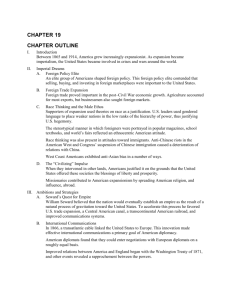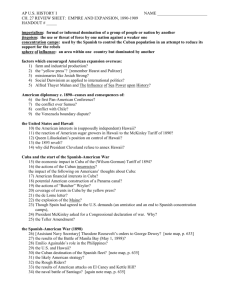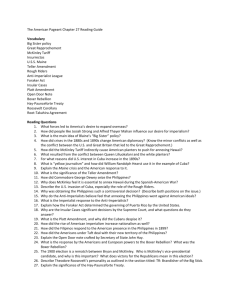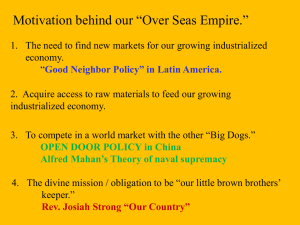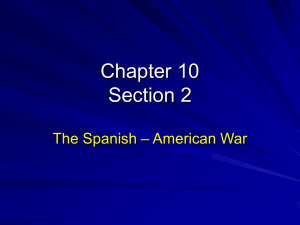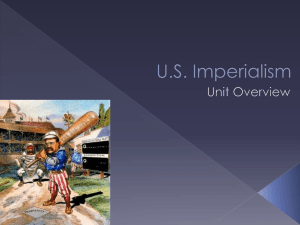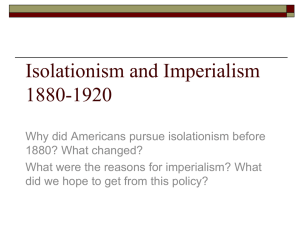Chapter 21 - Prong Software
advertisement
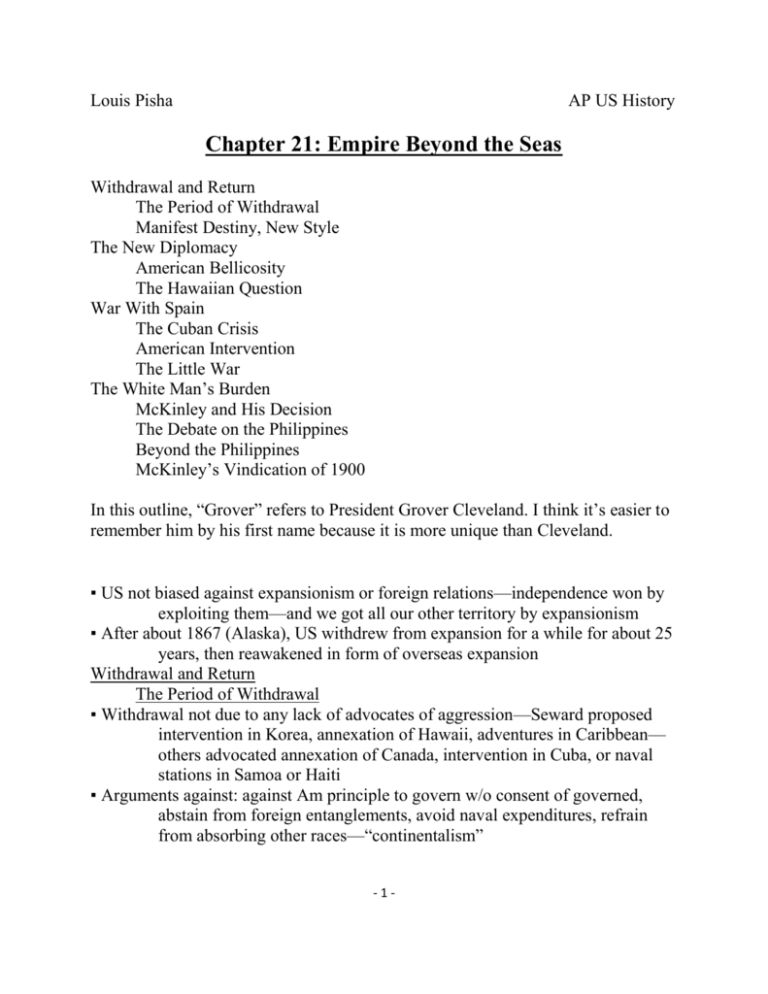
Louis Pisha AP US History Chapter 21: Empire Beyond the Seas Withdrawal and Return The Period of Withdrawal Manifest Destiny, New Style The New Diplomacy American Bellicosity The Hawaiian Question War With Spain The Cuban Crisis American Intervention The Little War The White Man’s Burden McKinley and His Decision The Debate on the Philippines Beyond the Philippines McKinley’s Vindication of 1900 In this outline, “Grover” refers to President Grover Cleveland. I think it’s easier to remember him by his first name because it is more unique than Cleveland. ▪ US not biased against expansionism or foreign relations—independence won by exploiting them—and we got all our other territory by expansionism ▪ After about 1867 (Alaska), US withdrew from expansion for a while for about 25 years, then reawakened in form of overseas expansion Withdrawal and Return The Period of Withdrawal ▪ Withdrawal not due to any lack of advocates of aggression—Seward proposed intervention in Korea, annexation of Hawaii, adventures in Caribbean— others advocated annexation of Canada, intervention in Cuba, or naval stations in Samoa or Haiti ▪ Arguments against: against Am principle to govern w/o consent of governed, abstain from foreign entanglements, avoid naval expenditures, refrain from absorbing other races—“continentalism” -1- ▪ Still, Garfield and Arthur wanted to advance goals of prestige, markets, and security, especially in Caribbean, also treaty with Korea and negotiations with Congo ▪ On the other hand, Americans internally preoccupied, and reflected in Cabinet department, navy, merchant marine, reliance on natural protection (wide ocean, weak neighbors, rivalries kept enemies busy) ▪ US tended to engage in disputes with world powers beyond its strength, especially Great Britain, such as renewal of fishing rights disputes along British NA, also fur-seal industry in Bering Sea (decided by international court of arbitration) ▪ Port of Pago Pago on Tutuila Island in Samoan Islands—US got treaty to establish naval station there—Br and Germ got similar treaties—seven warships anchored there and tensions built—hurricane sunk ‘em all except 1 and tripartite protectorate worked out Manifest Destiny, New Style ▪ Difficult agreeing on causes of it—some say largely due to chance, absentmindedness ▪ Some influences: Social Darwinism (rationalization of Manifest Destiny), racism and Anglo-Saxon superiority—divine sanction—Protestant missions ▪ Another reason is because they could—they had a strong navy—1883-1890 Congress authorized construction of a bunch of battleships that showed Congress’s intention to have a world-class navy (3rd by 1900) ▪ Mahan’s book, The Influence of Sea Power upon History, was more a reflection than a cause but came out at the time and influenced “the large policy” of expansionism ▪ Arrival of new generation—last one had the Civil War and then looked inward— new looked out and Europe carving up each other, Africa, Asia, Pacific, and looking to W hemisphere—now America felt obliged to enter the fray, take up the “white man’s burden,” and reap the booty ▪ Economic interpretations of expansion questionable—depression aroused concern over need for foreign markets and want for China—but then a historian showed business leaders at first opposed expansion, and then supported it The New Diplomacy American Bellicosity ▪ Blaine, sec of state under Harrison, revived expansionism (had sought naval bases in Santo Domingo and Haiti) but now wanted promotion of US trade in Caribbean, naval bases, isthmian canal, so called conference of Am republics ▪ Became Pan-American Union but would not accept his proposals for a while -2- ▪ Meanwhile, Jingoism—a new martial spirit—began to be expressed in talk of war with Italy, Chile ▪ Mood continued to mount, especially since war still considered glorious ▪ Boundary dispute between Venezuela and British Guiana—when gold found there, US demanded Britain submit decision to international arbitration, and made ultimatum-like statement ▪ Brit foreign minister took time in replying and refused to submit to international arbitration—Grover told Congress to make a commission to make boundary and enforce decision—Britain backed down finding itself in trouble in South Africa and few allies—negotiated treaty in Venezuela’s favor The Hawaiian Question ▪ Grover traditionally against annexation of Hawaii—sentiment dated back to Chinese trade, then missionaries, then sugar growers ▪ US opened free market to Hawaiian sugar planters and production skyrocketed— then when McKinley tariff admitted other foreign sugar on same terms, precipitated economic and political crisis ▪ King Kalakaua forced to accept power-curbing constitution—then sister Liliuokalani showed wanted to throw it off ▪ 1893 group of businessmen-revolutionaries told her to abdicate—then US sent marines there to raise Am flag—then she capitulated ▪ Harrison sent treaty to Senate to annex, but delayed until Grover inaugurated in a few days—when he was, sent commission to investigate and found most citizens of Hawaii supported queen so wanted to restore her but rev provisional government kept power ▪ Republican party made annexation a plank in 1896, and McKinley sent such a treaty to Senate where it laid around for a year until after war with Spain War With Spain The Cuban Crisis ▪ War grew out of deplorable conditions in Cuba, not expansionist sentiment ▪ Cuban revolts and ten years war—new civil war 1895—had been exacerbated by Am tariff policy which brought economic discontent ▪ Both sides used savage methods—Cubans destroyed crops and supplies— Spanish “reconcentrated” Cubans into ghettos where they promptly died ▪ Little required to whip up American sentiment for rebels, especially since they were neighbors fighting for freedom from an unjust imperial ruler, and America spoiling for a fight ▪ “Yellow journalism” exacerbated it by sending reporters to Cuba to collect human-suffering stories -3- ▪ Many Protestants, newspapers, and both parties wanted war for nonimperialistic purposes, but many also explicitly imperialist American Intervention ▪ Grover opposed intervention in every way, but in last annual message changed and gave rationalization for it ▪ McKinley tried to curb jingoes but really wanted to keep Republican party together ▪ Change of government in Spain brought in Cuba-somewhat-self-governing prime minister but unwilling to accept independence ▪ 1898, letter stolen from Spanish ambassador to US dissing McKinley—then battleship Maine blew up, possibly from mine under it—then Proctor delivered report about bad conditions in Cuba ▪ McKinley proposed peace settlement to abandon reconcentration, grant armistice, peace negotiations with insurgents—Spain agreed after a while, did submit to arbitration Maine but didn’t promise independence ▪ McKinley sent warlike message to Congress—Congress recognized independence of Cuba and renounced any imperialist designs (Teller Amendment) ▪ Spain and US declared war The Little War ▪ The war was the most popular war in American history ▪ Dewey’s victory in Manila Bay in Philippines—sunk entire Spanish squadron ▪ Army expedition to Cuba quite spirited but badly supplied and planned— presided over by General Shafter ▪ Spanish obligingly let their fleet be blockaded in Santiago Harbor by US under Sampson ▪ Most publicized unit was Rough Riders under Wood (Roosevelt vocally secondin-command) ▪ Both sides horribly organized—Spanish had many more troops so could have wiped us out but bad transportation—US tried to discoordinately capture San Juan Hill ▪ Able to take it but desperately needed supplies ▪ Admiral Cervera steamed out of Santiago Harbor to go down with a fight against the US blockade, and they sure went down with only 1 American killed (Next day 4th of July) ▪ Shafter still continued his siege and after a minor battle, Spain agreed to terms of surrender (included US give up prisoners) -4- ▪ Also US planned occupation of Puerto Rico by General Miles—natives deserted Spanish army en masse and Miles met little opposition, well planned and conducted ▪ Meanwhile, Americans brought troops to Manila Bay and built up strength, Spanish surrendered city ▪ US made sure not to recognize insurgents ▪ Negotiations on armistice not done until August 12 The White Man’s Burden McKinley and His Decision ▪ Armistice left open question of what would happen to Philippines—to seize them would be to violate America’s founding principles ▪ Large policy prevailed in Congress and Hawaii claimed as halfway station to Philippines, so joint resolution annexed it ▪ McKinley had his epigrams (Duty determines destiny), and clear favored annexation of Philippines ▪ Commercial and industrial interests, although at first feared for gold standard, now supported expansion because advancement of trade (Some saw Philippines gateway to China) ▪ Religious press stepped up claim that imperialism to Christianize the heathen ▪ Also popular was to attribute imperialism to determinism—hand of God, laws of Darwin, etc ▪ 3 out of 5 of commissioners to negotiate with Spain were expansionists—also US taking of Guam ▪ McKinley stuck to position of getting the Philippines and almost back to blows but offered $20 million for them and Spain capitulated and treaty signed December 10, 1898 ▪ Prez’s reason for Philippines: dishonorable to give them back, bad biz to let Germany or England seize them, unfit for self-rule, civilization and Christianization absolutely necessary The Debate on the Philippines ▪ Question was whether treaty would be ratified by Senate—Democrats united against it and some Republicans broke over it ▪ Anti-Imperialist League formed—Boutwell, Grover, Gompers, Carnegie, Schurz, Sherman, Adams, intellectuals, writers (Twain especially) ▪ Hoar, a spokesman, appealed to nation’s oldest values, led fight against it in Senate—said would be break with past, turn war of liberation into war of conquest, end one imperial rule with another -5- ▪ Also probability of a war with Japan or China, Declaration of Independence, Asians could not be assimilated, imperialism would lead to racism at home, overseas expansion anti-Monroe-Doctrine, racism for and against ▪ Defenders’ arguments: naval strategy, world power, commercial interests, duty, destiny, humanitarianism, religious mission, exaggerated economic advantages, not ready for self-government ▪ Bryan confused the cause by saying that Senate should ratify the treaty and leave disposition of Philippines to the polls—believed would help him in election of 1900 but actually helped the other side ▪ News the day before ballot that Filipinos were in armed rebellion against US— voted for treaty ▪ Meanwhile, US still in control of Cuba, and had them put into their constitution Platt Amendment which limited power of Cuba to do stuff w/o US’s approval, and allowed US intervention ▪ Fear of looking weak and ugly impulse of aggression mainly stimulated imperialism Beyond the Philippines ▪ Impending dissolution of China by imperial powers ▪ Hay sent “Open Door” notes to Br, Germ, Rus, later to Japan, Italy, Fr saying: 1. Nobody would interfere within anyone else’s sphere of influence 2. Chinese tariff duties should be collected on all merchandise by Chinese officials (Am had most favored nation treatment) 3. No power should discriminate on harbor or railroad dues ▪ Got some cold reactions but Hay boldly stated everyone agreed ▪ Boxer Rebellion of fanatical Chinese patriots besieged legations in Beijing—W powers and Japan sent troops to help beat it down and US contributed 5,000 ▪ Hay labored to keep down extent of involvement and rapid withdrawal of troops ▪ Hay issued a circular saying US policy to keep China safe and keep the existing government—helped to soften punitive terms on China—accept reparations in money not territory, and US got $25 million, $10 of which was returned in gratitude for education of Chinese youth McKinley’s Vindication of 1900 ▪ Bryan believed in campaign, anti-imperialist sentiment could be revived—but now people used to empire, war in Philippines being carried on with brutality to deny freedom just like brought in Cuba and excuse, “peace has to be restored” ▪ Return of prosperity at home distracted a burdensome conscience -6- ▪ New imperialism and patriotism dampened radicalism in labor and agrarian movements—war finished the Populist party—split and many joined Social Democrats ▪ McKinley hailed himself as “advance agent of prosperity”—Dingley Tariff raised protection, gold safe—Republicans: McKinley prez, Roosevelt VP ▪ Democrats: Bryan and Adlai Stephenson—stressed imperialism and free silver— later shifted emphasis to monopoly and special privilege—Bryan lost home state, silver issue, voters would not vote against prosperity -7-

